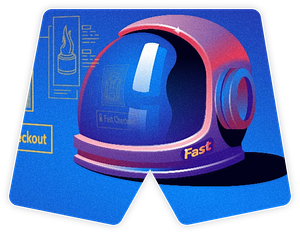Hello! Welcome to Three Shorts, a recurring series where I unpack the strategy behind the news in as few bullet points as possible. This is a preview of a Divinations Premium post.
Enjoy!
Fast’s rumored $1b valuation — a hail mary 🙏
What happened?
Last week, it was leaked that Fast, an online checkout company, is looking to raise $50–$200 million at a $1 billion valuation.
Seven months ago, Stripe invested $20m at a valuation of $180m.
Fast's goal is to compete with instant-pay products like Apple Pay, Google Pay, Amazon Pay, PayPal, and Shopify's Shop Pay with a solution that is platform agnostic, universal, and, uh, fast.
It’s unclear what sort of transaction volume Fast is processing, but when asked what websites use Fast, their CEO tweeted a list that suggests adoption of Fast is likely limited to smaller brands.
Why? What’s the strategy?
Why raise so much money at such a high valuation so early in the life of the company? My guess is Fast’s founders believe they need to, in order to overcome the massive chicken-and-egg problem their business is facing.
Fast only saves consumers time if they’re already signed up. And consumers will only sign up if Fast is on a lot of merchant’s websites. This is a problem for Fast now, but if they can somehow reach escape velocity, the network effect becomes a huge advantage.
Perhaps Fast is discussing raising an enormous sum of money in order to brute force a massive campaign designed to kick-start the network effect.
Some investors (Softbank?) might entertain a $1b valuation despite extremely limited traction, because if it works, they think it’ll be worth much more. And if it doesn’t work, it’s ok, because this is a high-risk asset class anyway.
Will it work?
If history is any guide, chicken-and-egg problems like these usually aren’t solved by brute force. Just look at Quibi and Magic Leap — they both spent tons of money developing a core platform and trying to attract creators and consumers, but failed.
But then again, sometimes it does work! PayPal attracted 100k users in their first month by offering $20 for you to sign up, and another $20 if you referred a friend. In total they spent $60–$70 million on the campaign. Who knows where they’d be if they hadn’t.
Another interesting example is TikTok — they spent nearly $1b on advertising in 2018 to acquire users to accelerate their network effect.
So, will it work in Fast’s case? I don’t think so. Adding a new checkout method to your ecommerce website is a much higher stakes decision than signing up for PayPal. Their value proposition is dependent on scale, and I don’t think a huge advertising campaign or sales push would change that.
Fast needs a better wedge, a product with more “single player” value for website owners.
McDonald’s new “McPlant” line — a power move 🌱💪
What happened?
This week, after successful pilot programs in Canada, McDonald’s announced their new global line of plant-based beef and chicken products, which they’re branding “McPlant”.
This follows successful moves by rivals like Burger King’s partnership with Impossible Foods, Dunkin Donuts’ partnership with Beyond Meat, which normalized plant-based offerings from fast food restaurants.
Pizza Hut also announced this week their own plant-based sausage partnership with Beyond Meat.
Unlike all these other partnerships, McDonald’s plant-based meats will not be co-branded with their supplier.
Why? What’s the strategy?
The most interesting and important part of this move is that McDonald will not co-brand their products with “Beyond” or “Impossible” labelling.
<Redacted>
<Redacted>
(You get the idea)
The rest of this article unpacks the strategy behind McPlant’s branding, and then moves on to Apple’s new ARM-based M1 chip, which is a textbook example of disruption in action.
My plan for the foreseeable future is to continue publishing Three Shorts every week. I’ll cover the strategy behind the news in the concise bullet-point format (what happened? why? what’s the strategy? will it work?) so you can start to train your neural net on the most important strategy frameworks while keeping up with latest happenings. Just like a ML algorithm can learn object detection or face detection, you will learn strategy detection.
Sound interesting?
Everything you get when you subscribe:
Full access to the Divinations archives, including my best essays (Finding Power, Disrupting Disruption, Your Actual Competition, Strategy Smells, etc)
The Everything bundle now has 10 paid newsletters including Divinations. Here are a few articles from around the bundle that you should pay attention to:
A Sneak Peak at Clay.earth — a next generation personal CRM, by Dan Shipper in Superorganizers
Can Political Betting Markets Predict Election Outcomes?, by Conor Durkin in Napkin Math
Glenn Greenwald Goes Independent Following Biden Story Dispute, by Li Jin in Means of Creation



